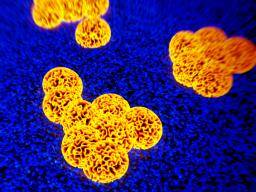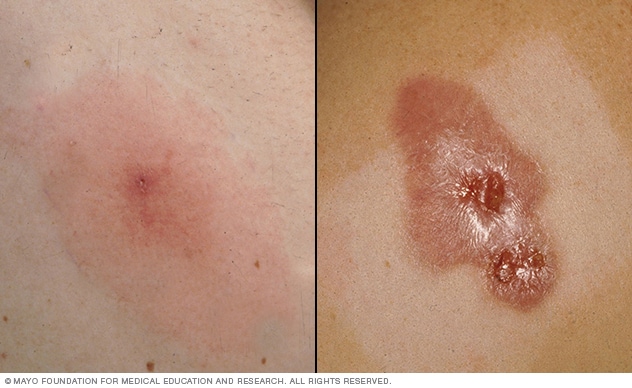Antimicrobial drugs
Definition:
Antimicrobial drug: A drug used to treat a microbial infection.
"Antimicrobial" is a general term that refers to a group of drugs that includes antibiotics, antifungals, antiprotozoals, and antivirals.
MRSA Infection Causes, Symptoms, and Treatment
What is MRSA?
Methicillin-resistant Staphylococcus aureus (MRSA) are shown in this scanning electron microscope picture. Strains of these bacteria (commonly termed "staph") may cause infection in almost any part or organ system in humans. MRSA strains are further characterized as superbugs because MRSA strains are resistant to many different antibiotics.
Initially, MRSA infections in the skin resemble minor skin infections; they appear as a red bump, pimple, or boil on the skin that may be painful, swollen, or warm to the touch. Occasionally, these infections may open and have pus drain from the area. Although most MRSA skin infections are mild, some progress and spread further into the skin and to other areas or organ systems.
MRSA Skin Infection and Cellulitis
Often, the first indication of MRSA infection is a spread of the infection into the surrounding skin, producing skin that is pink or reddish and often is warm, tender, and swollen. Such an infected skin area is termed cellulitis and represents infection spread into deeper skin layers. Cellulitis can rapidly advance (over a few hours) in some individuals.
How Do People Catch MRSA?
MRSA is easily spread to other individuals by people with the organisms on their skin. Usually, either skin-to-skin contact or contact with towels, razors, or even doorknobs or benches can transfer MRSA to another person. Some people, termed carriers, have MRSA strains on their body but have no symptoms; however, these people can still transfer MRSA to others by direct and indirect contact (towels or clothing that carriers have used).
Who Can Get MRSA?
Some individuals are at higher risk to get MRSA than others. People who have a chronic medical condition (for example, cancer, HIV, or any immune depression), the elderly, individuals in hospitals, or those who have had recent surgery are at higher risk for MRSA infections.
Can Healthy People Get MRSA?
MRSA can easily infect healthy people. Outbreaks have been documented at many areas where people are crowded together (for example, gyms, dormitories, barracks, prisons, and day-care centers). The type of MRSA obtained by healthy people outside of health-care facilities is often termed community-associated or community-acquired MRSA (usually termed CA-MRSA) by many clinicians.
How Is MRSA Diagnosed?
Definitive diagnosis of MRSA is not difficult. However, it may take a few days because, after S. aureus is cultured from an infected site, the bacteria then need to be tested against antibiotics to determine not only what the bacteria are resistant to but also what antibiotic(s) might be effective.
How Is MRSA Treated?
A doctor should guide treatment of MRSA infections. Most treatment methods depend on the severity of the infection and the resistance pattern of the bacteria. Some minor sores or small abscesses may need only warm compresses for pus drainage (if present) and cleaning and coverage with a small bandage. Many clinicians will prescribe an oral antibiotic that some MRSA are usually sensitive to (for example, sulfamethoxazole and trimethoprim [Bactrim], linezolid [Zyvox], or clindamycin [Cleocin T]). More invasive or severe infections might respond to oral antibiotics, but many clinicians may choose to treat such infections with IV drugs such as vancomycin (Vancocin), possibly along with a second IV antibiotic. Most severe infections are treated in consultation with an infectious disease specialist.
MRSA in Dogs and Cats
RSA can be transferred to pets such as cat or dogs (the animals may have no symptoms like human MRSA carriers) and, unfortunately, may reinfect the pet owners or other people. Only CA-MRSA strains have been documented to do this with pets.
MRSA Complications
MRSA infections (especially those associated with health-care facilities) can be dangerous; they can spread rapidly to other body areas and organs and cause serious organ damage or death. At their peak, reports indicated there were about 19,000 deaths in a year due to MRSA, but recently, this rate has decreased because of good hospital practices according to the CDC.
How to Avoid MRSA
Avoiding or reducing the chance of getting infected with a MRSA strain of S. aureus is fairly easy -- the cardinal rule is frequent hand washing with soap and water. Using an alcohol-containing hand sanitizer can also reduce infection risk. Avoid skin-to-skin contact with others if possible. Don't share towels and never touch bandages or wounds on other people, especially if they are hospitalized. Again, hand washing and showering with soap and water is the key to reducing MRSA (and other) infections. Disinfecting surfaces and other items also reduces the chances for infection.





0 Comments
Thanks For Comment